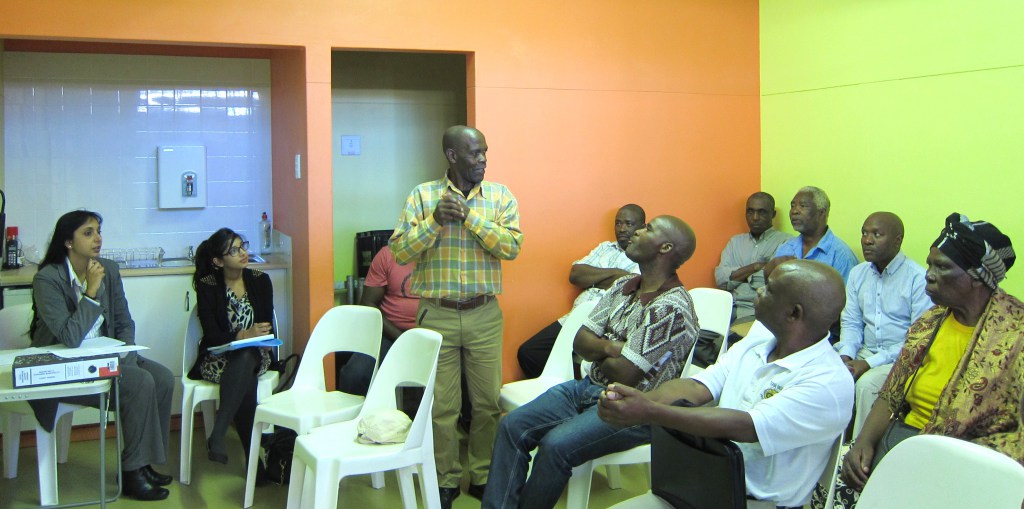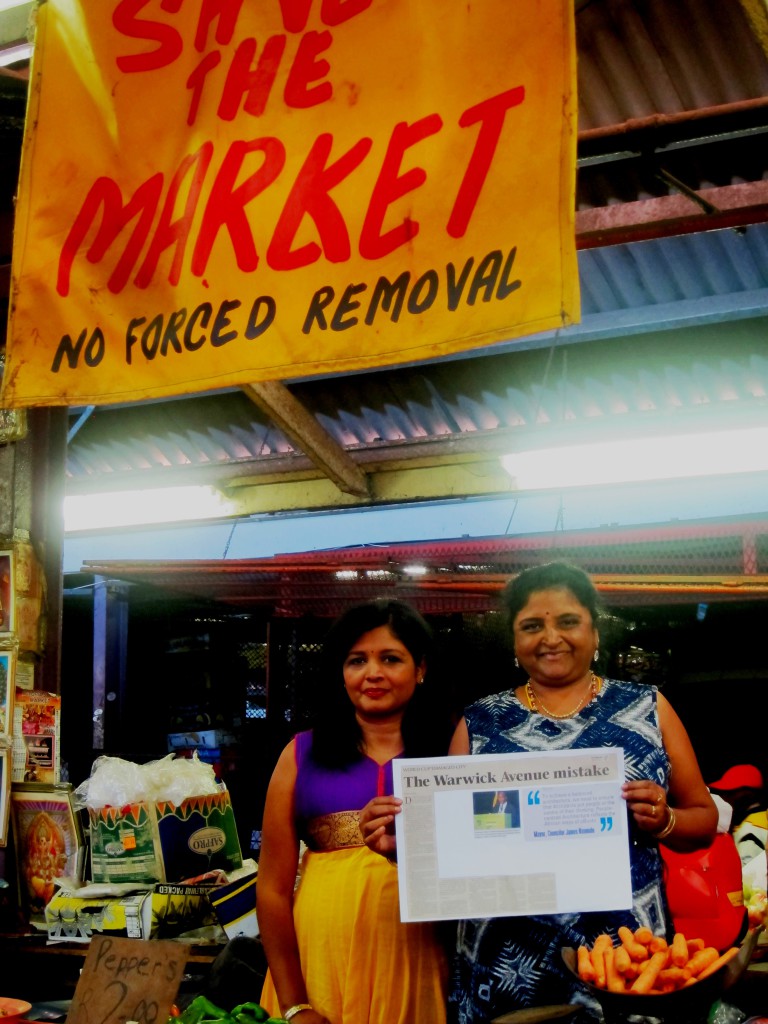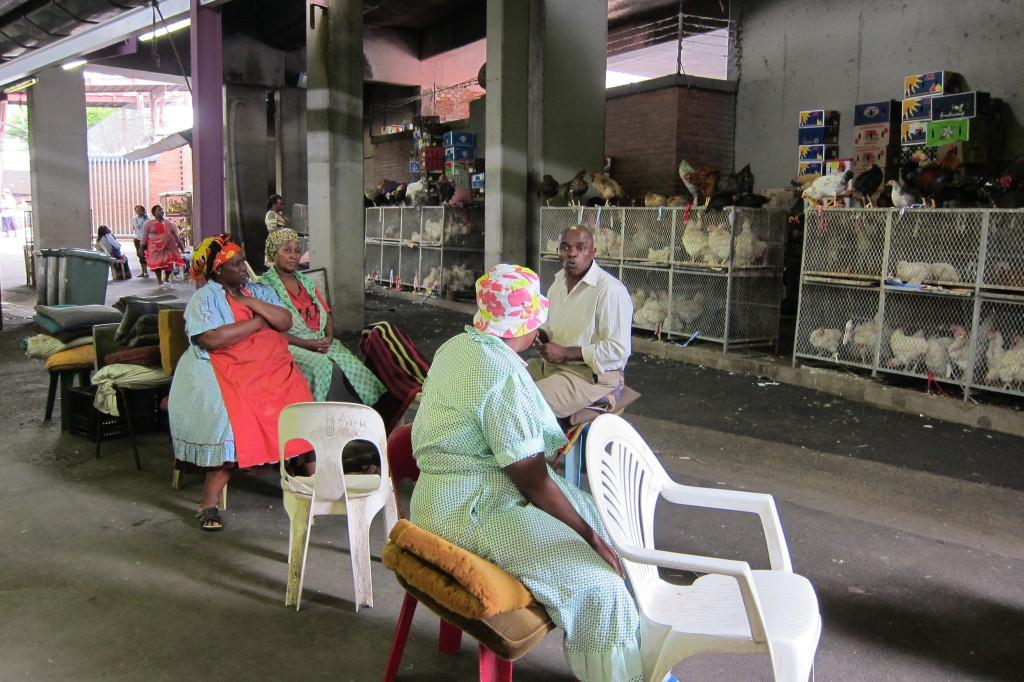Tasmi Quazi
The first and second in the four series article presented our work in the fields of “design” and “urban intelligence” respectively. The third in the series will reflect on our work in the field of “advocacy”. Within “advocacy”, Asiye eTafuleni (AeT) works to include the voices of informal workers in urban decision making processes and provides litigation support to ensure their rights to sanctioned and conducive workplaces.
Informal workers, who are some of the poorest and most vulnerable workers globally are privy to precarious legal circumstances. As development practitioners working with informal workers, contending with legal matters is almost unavoidable because they operate from public spaces that is claimed, contested and potentially developed with public money. The contentious environment is aggravated by the selective interpretation or disregard of bylaws by regulation authorities and police enforcement, corruption and the lack of inclusion of informal workers in urban decision making processes.

- This article was featured in the Daily Sun on 10th October 2011 about the everyday challenge of excessive police enforcement. What’s more, is the disregard of legal processes by police officials in ensuring that confiscated goods are returned to the informal traders after they have paid their fines, and in many instances, where receipts are not issued after the confiscation of goods.
Furthermore, informal workers do not have ready access to legal services nor do they have the resources to afford these services. Pragmatism dictates that that they comply with abusive systems to resume their work as soon as possible and the prevalence of any unjust incident is usually suppressed. As the unjust incidents are not being challenged at law, they result in the lack of judicial judgements which routinely establish legal precedent which could lead to legislative reform.

- Informal trader, John Makicwana, seen standing as he explains the significance of the court victory to other trader leaders in which he, with the assistance of LRC and AeT, successfully challenged the City regarding the confiscations of his business goods. Photo: Tasmi Quazi.
Informal workers therefore need access to the knowledge base, tools and resources necessary to effectively advocate for and claim their rights as workers – and to better understand their responsibilities. By integrating a focus on advocacy and litigation support into urban development, AeT has been able to address informal workers challenges in an integrated way, and enable their access to sanctioned and conducive workplaces.

- AeT’s conceptual approach to advocacy, read more here.
Some of AeT’s advocacy projects include:
Law Project – Confiscation case: AeT facilitated engagements between informal trader John Makicwana and Legal Resources Centre (LRC) after John chose to legally challenge the City about the unjust confiscation of his goods. This has served as a landmark case challenging specific by-laws and the constitutional legality of confiscation of traders’ goods. The case was heard in the High Court in October 2014 and the judgement in February 2015 ruled in favour of John deeming confiscations “unlawful, invalid and unconstitutional”. Read the full story here.

- Initial press interest attracted following John Makicwana’s case during the hearing. Photo: Richard Dobson.
Berea Station Committee: AeT has facilitated access to the LRC to assist in the event that the development of a formal shopping mall on the station precinct displace a number of informal workers. To support the Committee’s claim to a legitimate presence in the precinct, AeT is exploring a partnership with South African Slum Dwellers’ International (SASDI) to implement an innovative enumeration methodology.
UIA 2014 Public Debate Discussion: Along with the Head of eThekwini Municipality’s City Architects unit, Jonathan Edkins, AeT’s Senior Project Officer and two informal workers from Warwick Junction were invited as panelists at the UIA 2014 debate session titled “Global debates on access to the city: voices of Warwick”. During this session, the Head of City Architects offered a formal apology for the City’s approach to informal workers during the 2010 FIFA World Cup in relation to the proposed demolition of the Early Morning Market and police harassment.

- Third generation informal trader, Money Governder and her sister Sharon, at the Early Morning Market proudly holding the newspaper article titled “The Warwick Avenue Mistake” which captures the apology by a City official at the UIA 2014 Panel Debate. Photo: Tasmi Quazi.
Early Morning Market (EMM) Case: AeT’s participation with other parties successfully averted the demolition of the EMM. The LRC clients in the case were the informal workers surrounding the market and to date, the case has neither been formally concluded, nor the legal costs recovered. LRC in consultation with AeT, is continuing to pursue a final resolution which can then be publicised.

- AeT’s Senior Project Officer seen here talking to some of the Chicken Sellers operating from the Early Morning Market affected by the daily rental system. Photo: Tasmi Quazi.
Chicken Sellers case: AeT has facilitated negotiations between a group of Chicken Sellers within the Early Morning Market and a City official resulting in the review of the rentals charged by the City from a daily to a more reasonable monthly rate. Over a decade ago, the rental was structured at a daily rate on the premise that the Chicken Sellers traded intermittently, but over the years they became permanent. AeT’s advocacy role has been to ensure administrative justice through its input into the policy and regulatory environment. The Chicken sellers’ have reported experiencing a dramatic change in their household income saying,
“We can now buy essentials for our home and consider saving which we were unable to do when we were paying daily rent for our chicken business” (MaHlongwa)
AeT’s approach to advocacy is to empower informal workers with increased voice and agency, which was affirmed when MaShezi said:
“We have learnt through AeT’s involvement that we also need to strategically push to make positive changes happen and that we can’t only rely on others to speak about our grievances. In the past we have been ignored and certain officials act as gate-keepers preventing change…”
In conclusion, AeT’s experience has shown that development practitioners working with informal workers need to be inquisitive about the legal parameters and potential conflicts that they are engaging in.
An awareness of the legal parameters impacts the process of developing a macro programme, for example, in terms of compliance with local government processes such as public participation and the Municipal Finance Act within large development ventures. But also as it impacts the micro level, for instance, when intervening in the policy and regulatory environment or in developing appropriate infrastructure such that it minimises punitive regulation and enforcement, and enhances the livelihoods of informal workers.


